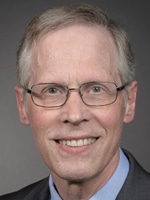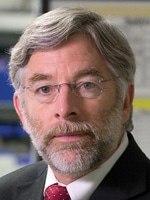September 2022—Never a better time than now to switch from the medical technologist job title to medical laboratory scientist. So says John Waugh of Henry Ford Health System, where the job title was formally changed. “Because our people are scientists,” he explains.
Waugh and other Compass Group members met online Aug. 2 with CAP TODAY publisher Bob McGonnagle, where they talked about the job title and testing for monkeypox.
The Compass Group is an organization of not-for-profit IDN system laboratory leaders who collaborate to identify and share best practices and strategies. Here’s what they shared last month.
Some governors are putting out alerts on monkeypox for their states. Jim Crawford, tell us about monkeypox in New York City.
James Crawford, MD, PhD, professor and chair, Department of Pathology and Laboratory Medicine, and senior VP, laboratory services, Northwell Health, New York: Monkeypox is alive and well in New York City. Governor Kathy Hochul declared a state disaster emergency on July 29. We have the susceptible populations. Northwell and Labcorp had set up a send-out test arrangement, and we have completed validation for in-house PCR testing.

Dr. Crawford
When I asked Stefan Juretschko [PhD, D(ABMM), Northwell senior director of infectious disease diagnostics] about positive samples, he said there is no problem getting them. Stefan also let me know that with what will hopefully be a defensible monkeypox vaccination program in New York City, we will offer monkeypox testing of indicated pustular lesions to people who come in for monkeypox vaccination. So, sooner than one might have thought, a new pandemic test is coming around.
Sterling Bennett, MD, MS, senior medical director, pathology and laboratory medicine, Intermountain Healthcare, Salt Lake City: Jim, what are you doing to alleviate concerns among your laboratory staff about handling specimens from individuals with monkeypox?
Dr. Crawford (Northwell): I have not heard doubts about universal precautions for monkeypox. Northwell was the first major health system to offer voluntary SARS-CoV-2 antibody testing to its health care personnel, and 46,000 out of 71,000 employees volunteered to have serology testing from April to June in 2020. Tylis Chang, MD, is coauthor of the investigation, which demonstrated that zip code by zip code, front-line health care workers at Northwell had lower positivity rates for COVID than their fellow residents, as did first responders [Moscola J, et al. JAMA. 2020;324(9):893–895]. So we demonstrated, to assure a worried workforce, that PPE works. I would hope that continues to be true for monkeypox.
Johan Otter from Scripps, what is your perspective on monkeypox in California?
Johan Otter, DPT, assistant VP, Scripps Health, San Diego: Most of the cases are in Los Angeles and San Francisco. We are sending out to ARUP now. As a commercial reference lab, they wanted to have two orders for every two swabs we send, but there’s plenty of viral material on every swab. We put them in one tube and send them off.
I haven’t heard about any safety issues from staff who collect specimens. We’re using standard precautions.
I’d like to direct your attention to a memo Henry Ford sent out this week. It says that medical laboratory scientist is now the most frequently used job title in the pathology and laboratory medicine product line, and Henry Ford Health has formally changed the job title of medical technologist to medical laboratory scientist. A similar change was made to create the titles of senior medical laboratory scientist and leader–senior medical laboratory scientist. This was done, the memo says, to modernize and align titles with universities and accrediting agencies. Over the past decade, it reads, universities have generally dropped medical technology in favor of courses of study in medical laboratory sciences, clinical diagnostic sciences, and biomedical laboratory diagnostics. Furthermore, Henry Ford says it hopes to reopen a clinical internship rotation as a school of medical laboratory sciences.
John Waugh, how did this change in title come about?
John Waugh, MS, MT(ASCP), system VP, pathology and laboratory medicine, Henry Ford Health System, Detroit: When I first came to Henry Ford, the staff who worked in our laboratories were called laboratory technologists, regardless of whether they worked in the clinical laboratory or research areas. But the degree that people get out of school is in medical technology, so why don’t we call them medical technologists? We made that change more than 20 years ago, yet they were still being referred to as lab techs. Are they technicians or technologists? Do you have to go to school for that? So there was a lot of in-house teaching with our groups. Over the past couple of years, I’ve had my nose in restarting our school of medical laboratory sciences, because it went on the budget cutting-room floor a number of years back.

Waugh
There’s never been a better time than now to make a change because our people are scientists. My primary motive was to get a title that would do justice to the preparation and work they do every day. I thought it would give due recognition to our people, and they could be referred to by a title that more adequately represents their academic standards. I also hope it will help us with recruitment and retention.
The staff love the change. It’s been formalized for about a month and a half now.
Greg Sossaman, what’s your reaction to this news from John and Henry Ford?
Greg Sossaman, MD, system chairman and service line leader, pathology and laboratory medicine, Ochsner Health, New Orleans: John’s announcement is perfectly in line with the types of efforts going on nationally and with what we all would like to see in our own places as far as recognizing laboratory staff, who are often under-recognized. I applaud his effort and I’d like to see it replicated by all of us if possible.
Sam Terese, how about you?
Sam Terese, president and CEO, Alverno Laboratories, Indiana and Illinois: We made the title change to medical laboratory scientist a couple months ago. It fits with what they do as professionals in our laboratory, and it made sense to make it our standard in terms of what we search and hire for.
Joe Baker, what’s your reaction to the retitling of medical technologists and what’s happening with monkeypox?
Joseph Baker, VP of laboratory, Baylor Scott & White Health, Dallas: Regarding monkeypox, we have gone live with our in-house tests in our central Texas region at our Temple Medical Center, and they’re doing most of the testing in that region. We have clinic locations within our central Texas region that are sending directly to the county health departments or the state. In north Texas we are using our primary reference laboratory for the majority of testing, but we also have some facilities and clinics that are sending to the county and state as well. With all these testing locations, it has created LIS challenges because we’re not fully aligned on our IS applications. We are seeing cases in the Austin and Dallas areas.
We changed our job title to medical laboratory scientist about three years ago, except for staff who are uncertified; their title is medical technologist. We continue to partner with our human resources department and compensation to relook at the naming of our uncertified position and will be recommending that it is changed to medical lab scientist as well.
Steve Carroll, what’s going on in South Carolina?
Steven Carroll, MD, PhD, chair, Department of Pathology and Laboratory Medicine, Medical University of South Carolina: There have been 21 cases of monkeypox in the state as of today. We’ve had two cases at MUSC. We’re still relatively unaffected.
South Carolina Department of Health and Environmental Control is acting as our gatekeeper, and getting those specimens out through them is cumbersome. We are working on moving this in-house. Julie Hirschhorn [PhD, director of molecular pathology] is collecting the positive and negative controls she needs for that, and we’re getting the reagents in.
 CAP TODAY Pathology/Laboratory Medicine/Laboratory Management
CAP TODAY Pathology/Laboratory Medicine/Laboratory Management
